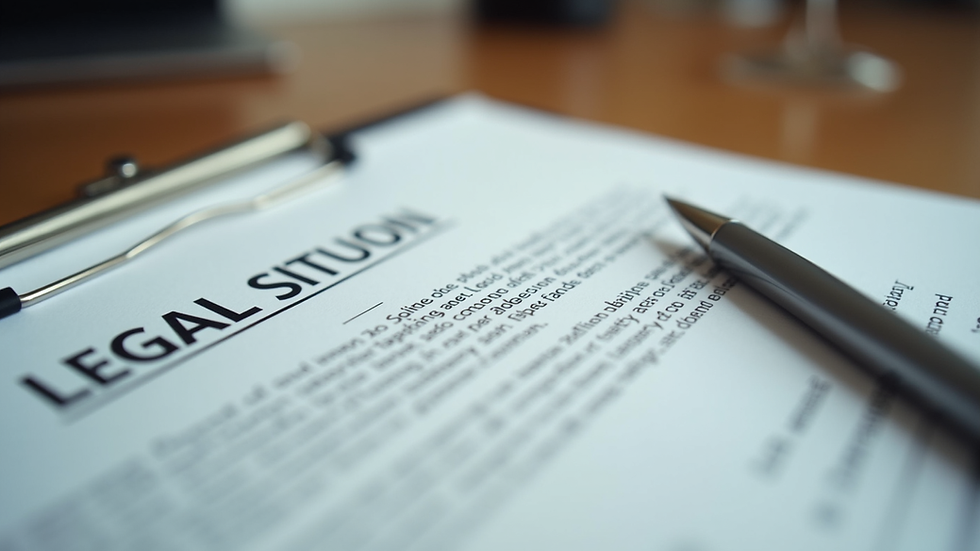Understanding Inheritance Tax: What You Need to Know
- Anita Barker
- Oct 20, 2025
- 4 min read
Inheritance tax can be a complex and often misunderstood topic. Many people worry about how much of their estate will be passed on to their loved ones after they pass away. Understanding the basics of inheritance tax, how it works, and what you can do to plan effectively can help you protect your assets and ensure your wishes are honoured.
Understanding Inheritance Tax Basics
Inheritance tax is a tax on the estate (property, money, and possessions) of someone who has died. In the UK, it is charged at 40% on the value of an estate above a certain threshold, known as the nil-rate band. As of the current rules, this threshold is £325,000. Anything above this amount may be subject to tax unless specific exemptions or reliefs apply.
For example, if someone leaves an estate worth £500,000, the taxable amount would be £175,000 (£500,000 - £325,000). The tax due would then be 40% of £175,000, which is £70,000.
There are some important points to remember:
The nil-rate band can be transferred between spouses or civil partners, effectively doubling the threshold to £650,000.
Certain assets, like a family home, may qualify for an additional main residence nil-rate band.
Gifts made during a person’s lifetime may reduce the value of the estate for tax purposes if they were made more than seven years before death.

How to Plan for Inheritance Tax
Effective planning can help reduce the amount of inheritance tax payable. Here are some practical steps you can take:
Make a Will
A clear and legally valid will ensures your estate is distributed according to your wishes. Without a will, the estate is distributed according to intestacy rules, which may not reflect your preferences.
Use Gifts Wisely
You can give away up to £3,000 each tax year without it being added to the value of your estate. Gifts made more than seven years before death are usually exempt from inheritance tax.
Consider Trusts
Trusts can be used to protect assets and control how they are distributed. They can also help reduce inheritance tax liability in some cases.
Charitable Donations
Leaving part of your estate to charity can reduce the inheritance tax rate from 40% to 36% on the whole estate.
Take Advantage of Reliefs
Certain business assets and agricultural property may qualify for reliefs that reduce their value for inheritance tax purposes.
Planning early and reviewing your arrangements regularly is key to making the most of these options.

Can I Just Gift 100k to My Son?
Many people wonder if they can simply gift a large sum, such as £100,000, to their children to avoid inheritance tax. The answer depends on timing and the rules around gifts.
If you gift £100,000 to your son, this amount will be added to your estate if you die within seven years of making the gift. This is known as the "seven-year rule." If you survive for more than seven years after making the gift, it will usually be exempt from inheritance tax.
There are also annual exemptions and small gift allowances:
You can give up to £3,000 per year tax-free.
Gifts of up to £250 per person per year are exempt.
Gifts made out of your income (regular gifts) may also be exempt if they do not affect your standard of living.
It is important to keep records of any gifts you make and seek professional advice to understand the implications fully.

Common Misconceptions About Inheritance Tax
There are several myths about inheritance tax that can cause confusion:
My estate is too small to be taxed
Many people believe their estate is below the threshold, but when combined with a spouse’s estate or including the family home, the value can exceed the limit.
Inheritance tax is paid by the beneficiaries
Actually, the executor or administrator of the estate is responsible for paying the tax before distributing the assets.
Only wealthy people pay inheritance tax
While it mainly affects larger estates, without proper planning, many middle-income families can face unexpected tax bills.
Gifts made at any time are exempt
Gifts made within seven years of death may still be taxed, so timing is crucial.
Understanding these facts can help you avoid surprises and plan more effectively.
What Happens If You Don’t Plan?
Failing to plan for inheritance tax can lead to significant financial consequences for your loved ones. The estate may have to sell assets quickly to pay the tax bill, which can reduce the value of what is passed on.
Without a will, the estate is distributed according to strict rules, which may not align with your wishes. This can cause family disputes and delays in the administration process.
Professional advice from estate planners or financial advisors can help you create a plan that minimises tax and ensures your estate is handled smoothly.
Understanding the rules and options around inheritance tax is essential for protecting your estate and providing for your family. By taking proactive steps, you can reduce the tax burden and ensure your assets are passed on according to your wishes. For more detailed information, visit inheritance tax.
%20(750%20%C3%97%20250px)(2).png)



Comments